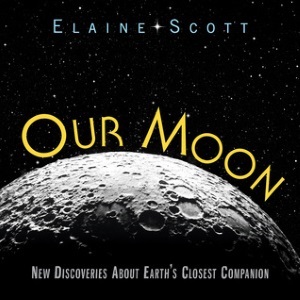2018 School Spending Survey Report
Review of Our Moon: New Discoveries About Earth’s Closest Companion
Our Moon: New Discoveries About
Earth’s Closest Companion
by Elaine Scott
Intermediate Clarion 72 pp.
 Our Moon: New Discoveries About
Earth’s Closest Companion
Our Moon: New Discoveries About
Earth’s Closest Companionby Elaine Scott
Intermediate Clarion 72 pp.
2/16 978-0-547-48394-8 $18.99 g
This deep dive into the science of the moon includes explanations of its formation and composition, as well as details about the all-important Apollo missions (1963–1972) and the latest in lunar exploration. Scott begins with a history of human surmise on the moon’s appearance, including the maps of early astronomers. Subsequent chapters provide the latest scientific consensus (known as the “giant impact theory”) on the creation of the moon during the earliest days of the formation of our solar system, the formation of craters and maria, and on the geology of moon materials (the so-called “moon rocks”) that were collected during the Apollo missions. Most exciting is the final chapter, in which lunar missions from 2007 to 2014 — and the scientists who worked on them — are profiled. During this timeframe, scientists have confirmed the presence of water on the moon, examined its dust, atmosphere, and gravitational field, and are currently considering what it would take for humans to live on the moon. Color photos and additional text boxes found on nearly every page are as informative as the main narrative. Appended with an extensive glossary; a brief list of further resources, both online and in print; and an index.
From the January/February 2016 issue of The Horn Book Magazine.
RELATED
RECOMMENDED
ALREADY A SUBSCRIBER? LOG IN
We are currently offering this content for free. Sign up now to activate your personal profile, where you can save articles for future viewing.







Add Comment :-
Be the first reader to comment.
Comment Policy:
Comment should not be empty !!!